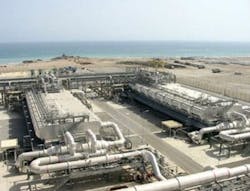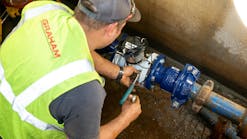Waste powered desalination plant being developed by Hitachi Zosen
| Oman: HZC's desalination project in Oman, including 3 x 31,300 m3/day units (Image: HZC) |
Engineering, procurement and construction (EPC) contractor Hitachi Zosen Corporation (HZC) is looking to combine its solid waste and water desalination businesses for the Middle East market.
The Japanese company has developed a desalination system that is powered by solid waste incineration, according to a report by Nikkei Asian Review.
Hitachi Zosen is planning to market a hybrid desalination plant powered by waste, as well membrane and thermal plants individually, according to the article.
One ton of waste can be thermally treated to produce 600 kilowatt-hours of electricity, or 1.2 cubic metres of water, it said.
Previously, HZC has delivered 42 multi-stage flash (MSF) installations, eight multi-effect desalination (MED) installations in Japan and 35 reverse osmosis (RO) installations, with six outside of its home country.
For waste to energy, the firm has over 10 plants in the execution phase and over 17 in operation.
In May last year the company received an order to deliver a hybrid MSF/RO project in Qatar for the Qatar Electricity and Water Company and Qatar Petroleum.
At the end of 2014, Hitachi secured a contract in a consortium with Veolia to provide EPC for a river water intake for the Basra reverse osmosis (RO) project (read WWi story).
The combined water and waste process has been reportedly designed for the Middle East market.
However, with abundant land and less stringent waste regulation compared to Europe and Japan, the region currently favours landfill disposal over incineration.
###
Read more
Pre-treatment contract awarded for Basra, Iraq desalination project
RO desalination kick-started in Qatar with Ras Abu Fontas A3 project




